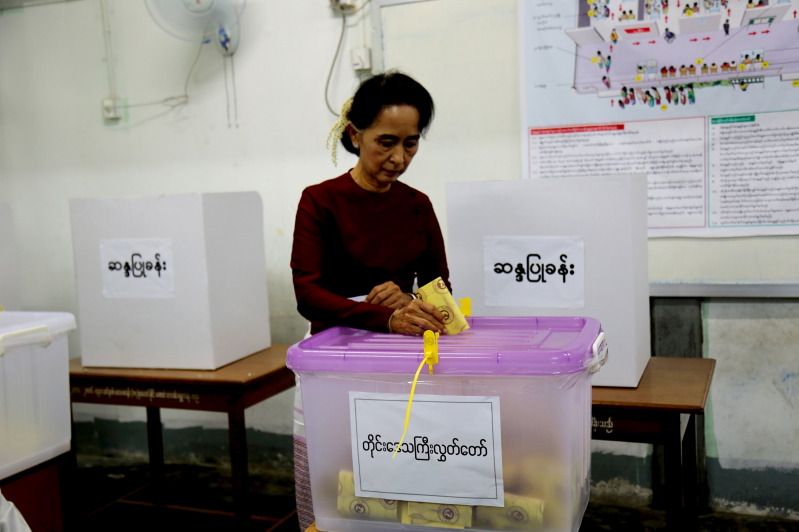
Myanmar democracy champion Aung San Suu Kyi made it clear on Tuesday that she was ready to defy the powerful military's attempts to clip her wings, as fresh results from Sunday's historic election showed her party heading for a resounding win.
As vote tallies trickled in, Suu Kyi's long-oppressed National League for Democracy (NLD) looked set to take control of most regional assemblies as well as forming the central government, a triumph that will reshape the political landscape.
Under the constitution drawn up by Myanmar's former junta, Suu Kyi is barred by the constitution from taking the presidency because her children are foreign nationals, a clause few doubt was inserted specifically to rule her out.
But in two interviews on Tuesday, the Nobel peace laureate said that, whoever was appointed president by the newly elected houses of parliament, she would call the shots.
She told the BBC that she would be "making all the decisions as the leader of the winning party" and Channel News Asia that the next president would have "no authority".
The ruling Union Solidarity and Development Party (USDP), which was created by the junta and is led by retired soldiers, has conceded defeat in a poll that was a milestone on Myanmar's rocky path from dictatorship to democracy.
A CLEAR WIN
The NLD said its tally of results posted at polling stations showed it was on track to take more than two-thirds of seats that were contested in parliament, enough to form Myanmar's first democratically elected government since the early 1960s.
The party would win more than 250 of the 330 seats not occupied by the military in the lower house of parliament, NLD spokesman Win Htein predicted on Tuesday. Under the junta-crafted constitution, a quarter of the seats are unelected and reserved for the armed forces.
Reuters was not able to independently verify the party's own estimates of its performance.
The election commission said the NLD had won 78 of the 88 seats declared so far for the 440-strong lower house. The USDP had won five seats.
In the first results for the upper house declared on Tuesday, the NLD won 29 of 33 seats while the USDP won two. Results for the regional assemblies also showed the NLD well ahead.
"The difference between the parties is huge. It's a clear win," said Sitida, a 37-year-old Buddhist monk in the central city of Mandalay who marched in the country's 2007 "Saffron Revolution" protests that were crushed by the junta.
Sitida, who was sentenced to 70 years in prison for his role in the demonstrations but was given amnesty as part of political reforms in 2011, said the military would now have to accept the NLD's win and negotiate an orderly retreat from politics.
"Daw Suu can make this happen. Daw Suu can convince them," he said, referring to Suu Kyi with an honorific.
However, while the USDP has been cut down and much of the establishment shaken by the extent of Suu Kyi's victory, the army remains a formidable power.
In addition to his bloc of parliament seats, the commander-in-chief nominates the heads of three powerful and big-budget ministries - interior, defense and border security - and the constitution gives him the right to take over the government under certain circumstances.
The military has said it will accept the outcome of the vote, and Suu Kyi said times have changed since the 1990 election she won in a landslide that the military ignored. She spent years under house arrest following that poll.
"I find that the people are far more politicized now than they were ... so it's much more difficult for those who wish to engage in irregularities to get away with it," she told the BBC.
"NOW COMES THE HARD PART"
Still, analysts say a period of uncertainty may be looming for former Burma because it is not clear if Suu Kyi and the generals will be able to share power easily.
Sunday's vote was the Southeast Asian nation's first general election since the military ceded power to a quasi-civilian government in 2011, ushering in reforms and opening up to foreign investors.
Money from abroad flowed in quickly as sanctions were eased. Foreign direct investment stood at $8 billion in fiscal 2014/15, more than five times the flows recorded just two years earlier.
Religious tension, fanned by Buddhist nationalists whose actions have intimidated Myanmar's Muslim minority, marred the election campaign. Among those excluded from voting were around a million Rohingya Muslims who are effectively stateless in their own land.
Suu Kyi, who has been criticized for saying little in defense of the Rohingya, said on Tuesday she would "protect everybody" in the country.
It would be difficult to eradicate prejudice, but people "do not want to live on a diet of hatred and fear," she told the BBC.
Washington welcomed the election as a victory for Myanmar's people, but said it would watch for the democratic process to move forward before making any adjustments to remaining U.S. sanctions on a country long considered a pariah.
President Barack Obama has invested significant personal effort in Myanmar, visiting the country twice in the past three years, hoping to make its democratic transition a legacy of his presidency and an element of his strategic "pivot" to Asia.
Daniel Russel, the U.S. assistant secretary of state for East Asia, said that after 50 years of military dictatorship, "this was a hell of a step forward for the democratic process in Burma" but added: "Now comes the hard part."





![[Exclusive Interview] A revelation within the brink of life and death — Meg Leung’s mission in Christian art](https://www.gospelherald.com/media/cache/thumbnail/7/21/72163sp_273w_150h_1x_1y.jpg)

